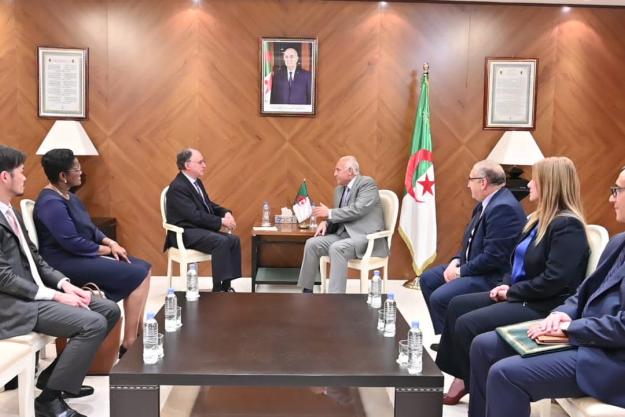
Director-General H.E. Ambassador Fernando Arias (left), Minister of Foreign Affairs and the National Community Abroad, H.E. Mr Ahmed Attaf (right)
ALGIERS, Algeria—9 October 2023—The Director-General of the Organisation for the Prohibition of Chemical Weapons (OPCW), Ambassador Fernando Arias, had a meeting with Algeria’s Minister of Foreign Affairs and the National Community Abroad, H.E. Mr Ahmed Attaf, on 2 October 2023 in the margins of CHEMEX Africa in Algiers, Algeria.
Ambassador Arias briefed the Minister on the Organisation’s activities in preventing re-emergence of chemical weapons and strengthening chemical emergency preparedness in Member States.
“OPCW and its Member States reached a major milestone earlier this year: the end of destruction of all declared chemical weapons stockpiles,” the Director-General emphasised. “However, our work is not done yet. With unprecedented progress in science and technology in areas such as Artificial Intelligence, the threat of chemical weapons re-emergence is more acute than ever. The OPCW Centre for Chemistry and Technology is an important tool for the Organisation to address these challenges and achieve a world, where chemistry is used only for peaceful purposes.”
The Director-General thanked the Minister for Algeria’s support in co-organising and hosting CHEMEX Africa, a two-week capacity building exercise, which took place from 23 September to 5 October 2023 in Algiers. During CHEMEX, more than 80 first responders from 33 African countries strengthened their knowledge and the skills required to manage and respond to complex chemical emergencies, including incidents and attacks perpetrated by non-State actors.
“Expanding national capacity in assistance and protection remains our responsibility under the provisions of the Chemical Weapons Convention,” the Director-General said. “CHEMEX was designed to enhance regional capabilities in Africa to protect from and respond to incidents involving toxic chemicals. This important exercise illustrates very well the type of support provided by the OPCW, together with its partners, to build collective resilience against chemical threats.”
The Director-General also congratulated the Minister on Algeria’s significant advancements made in developing its National Institute of Forensic Science and Criminology of the National Gendarmerie.
“Algeria is fully engaged in the implementation of the provisions of the Chemical Weapons Convention, in line with its constant commitment to the disarmament and the non-proliferation of weapons of mass destruction,” the Minister said.
“Moreover, Algeria avails its experience and expertise acquired within the OPCW to support the efforts of the Organisation in reaching the full implementation of the Convention in Africa,” he added.
“We express our highest appreciation for the endeavour of the Director-General, Ambassador Fernando Arias, in his laudable quest to make Africa a vector for the achievement of the Convention’s universality and to uphold its full implementation in the African continent and in countering chemical terrorism,” the Minister emphasised.
The Secretary-General of Algeria’s Ministry of Foreign Affairs and the National Community Abroad, H.E. Mr Lounès Magramane, and the Ambassador, Permanent Representative of Algeria to the OPCW, H.E. Mrs Salima Abdelhak, also attended the meeting.

Background
Algeria has been an active member of the OPCW since the Chemical Weapons Convention entered into force in 1997. Algeria is a member of the Executive Council, the OPCW’s executive organ, which is responsible for promoting the effective implementation of and compliance with the Chemical Weapons Convention as well as supervising the activities of the Organisation’s Technical Secretariat.
Algeria contributed EUR 15,000 to the Trust Fund for a Centre for Chemistry and Technology in 2020.
CHEMEX Africa is unique in its approach, combining a comprehensive theoretical framework with hands-on experience. Through this program, first responders were trained to manage the complexities of chemical emergencies. They learned how to identify, manage, and mitigate the threats posed by toxic industrial chemicals and chemical warfare agents.
During CHEMEX, first responders received rigorous training on the proper use of personal protective equipment, decontamination procedures, detection and sampling techniques, and incident commands.
Designed in the framework of the OPCW Africa Programme, CHEMEX Africa was sponsored by the Government of Canada through a voluntary contribution within the framework of the G7-led Global Partnership Against the Spread of Weapons and Materials of Mass Destruction.
The Czech Republic, the United Kingdom of Great Britain and Northern Ireland, the United States of America, the European Union, and other regional and international organisations provided expert supervisors, evaluators, and observers for the exercise.
As the implementing body for the Chemical Weapons Convention, the OPCW, with its 193 Member States, oversees the global endeavour to permanently eliminate chemical weapons. Since the Convention’s entry into force in 1997, it is the most successful disarmament treaty eliminating an entire class of weapons of mass destruction.
On 7 July 2023, the OPCW confirmed that all chemical weapons stockpiles declared by the 193 States Parties to the Chemical Weapons Convention since 1997 — totalling 72,304 metric tonnes of chemical agents — have been irreversibly destroyed under the OPCW’s strict verification regime.
For its extensive efforts in eliminating chemical weapons, the OPCW received the 2013 Nobel Peace Prize.
